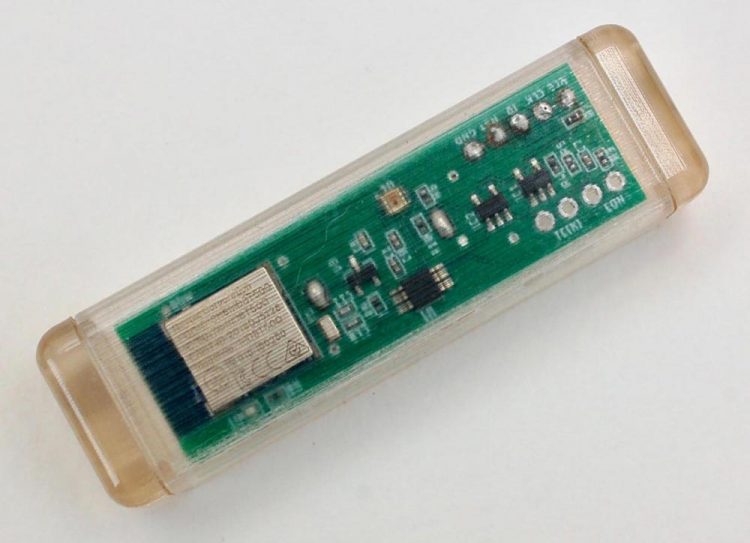Digitizing chemistry with a smart stir bar

The Smart Stirrer (above) can transmit data on the color, viscosity and other attributes of the solution it is stirring. Credit: Dmitry Isakov
Automatic, remote data collection can make chemical processes more reliable, as well as less labor intensive and safer. This technology has begun to make inroads into chemistry labs, but options for scientists looking to remotely mix their reactions and monitor several parameters while those reactions occur remain quite scarce, limited and expensive.
Nikolay Cherkasov, Dmitry Isakov and colleagues wanted to develop a device capable of simultaneously detecting numerous parameters using freely available open source software and easy-to-get, inexpensive components.
The team made two versions of the Smart Stirrer based on different integrated circuits, one a microcontroller and the other an all-in-one system on a chip. To customize the Smart Stirrer for different applications, the team used a modular design, in which sensors can be added as needed.
In experiments, they confirmed they could detect color, electrical conductivity and, with careful calibration, viscosity. Additional low-cost commercially available sensors, as well as custom ones, could be used to adapt the device for many new applications, the researchers say.
They note one limitation: the narrow range of temperatures within which the Smart Stirrer can function, a restriction that they say is inherent to most digital electronics. Ultimately, they predict that this approach could provide a platform for digitizing chemistry in research labs and industrial manufacturing.
###
The authors acknowledge funding from the Engineering and Physical Sciences Research Council Dial-a-Molecule Network, the Institution of Chemical Engineers Andrew Fellowship and the Warwick Manufacturing Group Summer Internship Programme.
The abstract that accompanies this paper can be viewed here.
The American Chemical Society (ACS) is a nonprofit organization chartered by the U.S. Congress. ACS' mission is to advance the broader chemistry enterprise and its practitioners for the benefit of Earth and its people. The Society is a global leader in providing access to chemistry-related information and research through its multiple research solutions, peer-reviewed journals, scientific conferences, eBooks and weekly news periodical Chemical & Engineering News. ACS journals are among the most cited, most trusted and most read within the scientific literature; however, ACS itself does not conduct chemical research. As a specialist in scientific information solutions (including SciFinder® and STN®), its CAS division powers global research, discovery and innovation. ACS' main offices are in Washington, D.C., and Columbus, Ohio.
To automatically receive press releases from the American Chemical Society, contact newsroom@acs.org.
Media Contact
All latest news from the category: Life Sciences and Chemistry
Articles and reports from the Life Sciences and chemistry area deal with applied and basic research into modern biology, chemistry and human medicine.
Valuable information can be found on a range of life sciences fields including bacteriology, biochemistry, bionics, bioinformatics, biophysics, biotechnology, genetics, geobotany, human biology, marine biology, microbiology, molecular biology, cellular biology, zoology, bioinorganic chemistry, microchemistry and environmental chemistry.
Newest articles

Pinpointing hydrogen isotopes in titanium hydride nanofilms
Although it is the smallest and lightest atom, hydrogen can have a big impact by infiltrating other materials and affecting their properties, such as superconductivity and metal-insulator-transitions. Now, researchers from…

A new way of entangling light and sound
For a wide variety of emerging quantum technologies, such as secure quantum communications and quantum computing, quantum entanglement is a prerequisite. Scientists at the Max-Planck-Institute for the Science of Light…

Telescope for NASA’s Roman Mission complete, delivered to Goddard
NASA’s Nancy Grace Roman Space Telescope is one giant step closer to unlocking the mysteries of the universe. The mission has now received its final major delivery: the Optical Telescope…



